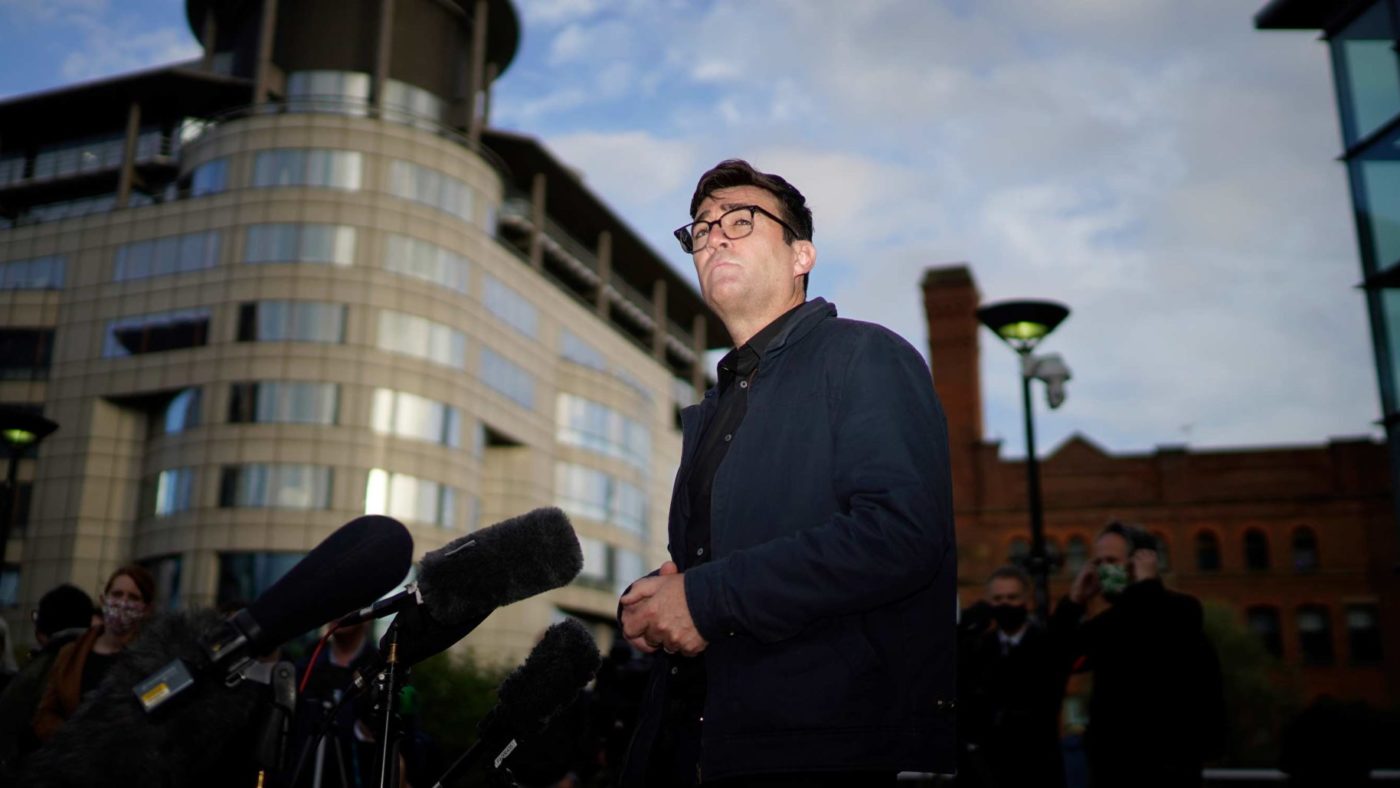Very occasionally in politics, the stars of personal and political biography align with the needs of the moment to elevate a politician into a more exalted register of communication. The celebrated example is, of course, Churchill – considered ludicrously overblown in peacetime, his style seemed somewhat less grandiloquent when juxtaposed with the devastation of war. Some politicians, such as Barack Obama, seem able to access this lofty plane almost effortlessly.
Most, however, never come close and for all the money in the world, one would have expected Andy Burnham to remain in that more numerous category. But that was before the Government somehow contrived to turn the Mayor of Manchester City region, into something approaching Nye Bevan incarnate.
Don’t get me wrong, Burnham’s widely shared response to a question from BBC Newsnight’s Nick Watt is not exactly “we shall fight on the beaches”. Nevertheless, his central, emotionally delivered argument – that it is unfair for the Government to ask low income workers that it, not market forces, has forced out of work to survive on just two-thirds of their income – will reverberate around the country. Particularly so in the northern ‘Red Wall’ communities the Prime Minister has staked so much of his political fortunes upon retaining and which may soon be joining Manchester in Tier 3 restrictions.
For Burnham, this moment is something of a culmination. Since his departure from Westminster politics – arguably even before – he has spent a fair amount of time trying on a northern, populist-lite political costume. However, it is only now, afforded the mother of all grievances, that the clothes are truly beginning to fit.
For the Government, on the other hand, it is more difficult to know where to begin. One could look to the Prime Minister and a total absence of leadership as the situation developed. One could look to how his government continually seems to embody the alleged ‘would cross a road to start a fight’ character of its chief advisor, Dominic Cummings. One might also briefly wonder at how broken is a Tory political machine that seems to have lost sight of the most basic political fact that all politicians, at any representative level, are fundamentally local.
However, for once, these more frequently observed components of the Government’s pandemic travails must defer to a new and more surprising one. Because this time the largest problem, as Burnham himself noted, is the Chancellor, Rishi Sunak.
Let us first dispense with the fiscal arguments. As the Economist’s Duncan Weldon has pointed out, the paltry sums the Government is reportedly haggling over are, in public sector accounting terms, a rounding error. Even if you offered the deal Manchester’s civic leaders are seeking to the entire country you would get nowhere near a single month of the original furlough scheme’s cost. Given the magnitude of the situation, not to mention the emerging evidence that links lower incomes to lower social distancing adherence, even that more expensive scenario should be viewed by the Treasury as small change well spent.
But of course, the Chancellor, a man who to a large extent owes his political standing to a doveish attitude towards the pandemic safety net, knows this. So, what on earth is going on? It is just about possible that this is all part of some ill-conceived attempt to curry favour with certain Tory backbenchers – a signal that the Chancellor too might prefer a more permissive approach to public health restrictions. A more likely interpretation is that, with one eye upon battles in a distant and very different future, Sunak is choosing now to try and impose a semblance of fiscal discipline on his party.
Alas, if that is his mission then his sense of timing could hardly be worse. Moreover, he is on a hiding to nothing. Even beyond the pandemic, this Government, with its billion upon billions of spending commitments – its “new deals” and its “build, build builds” – cannot credibly transform itself into a fiscally conservative one. The reason for this is simple: it has, with the possible exception of the Chancellor’s “viable jobs” mantra – an ill-judged phrase which will not survive even its earliest skirmishes with rising unemployment – no argument that would enable it to become one; it has no effective way of saying no. The Chancellor may just as well try and turn water into wine.
And so we have the situation in Manchester, which in its own way is a further example of the defeat the Government received at the hands of another Mancunian, the footballer Marcus Rashford, over extending free school meals into the school holidays. Having spectacularly abandoned its reputation for fiscal conservatism somewhere on the road to Brexit, every time there is a pressing social justice demand the Treasury would rather not meet, the Tories will now find themselves on the run.
To be clear: in terms of the short-term pandemic economics, that may be a good thing – if the Chancellor is saying the money has run out, he is looking at a different UK gilt market to me. But as a long-term marker in the battle for the soul of British Conservatism, he is probably not wrong to view his mission as priceless.
Click here to subscribe to our daily briefing – the best pieces from CapX and across the web.
CapX depends on the generosity of its readers. If you value what we do, please consider making a donation.


